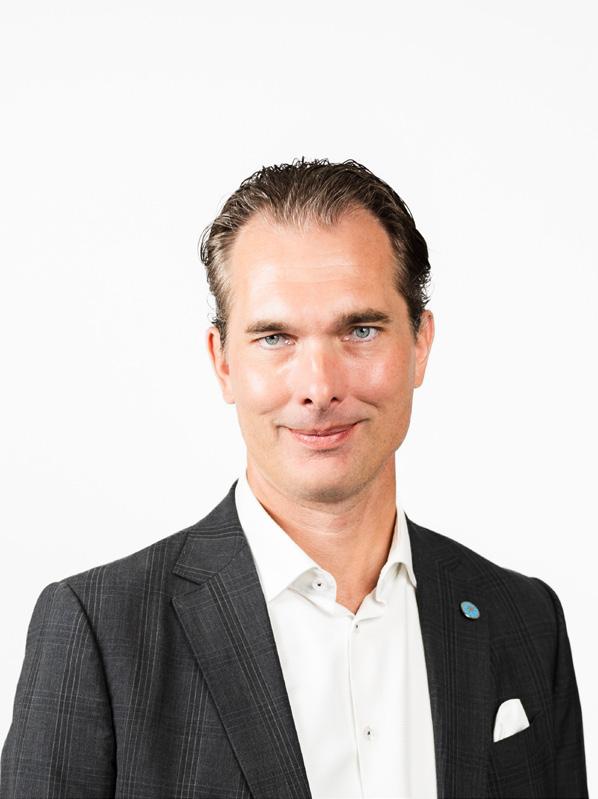









Future-proof your business and drive growth











Future-proof your business and drive growth
Officer


In the fast-paced world of procurement, adaptability and foresight are essential for success. Michael van Keulen, Chief Procurement Officer at Coupa Software, exemplifies this leadership ethos as he navigates the complexities of modern procurement. With a rich background in finance and extensive experience in driving operational efficiencies, Michael shares his journey, the innovative strategies Coupa employs, and his philosophy on leadership that cultivates a culture of collaboration and diversity. As Coupa continues to redefine the procurement landscape, Michael’s insights offer a valuable perspective on the future of the industry.
Can you share your career journey and what led you to your role as Chief Procurement Officer at Coupa Software?
My background is in finance. I started at Arthur Andersen back in the mid-90s. I always say I’m a recovering accountant forever. As a result, I did a lot of finance work in accounting. For example, I set up a finance shared service centre and did tax accounting, and then, at Foot Locker, I was first asked in early 2000’s, “Hey, Michael, are you interested in running e-sourcing for Europe?” I was the European controller at the time, and I thought, “I don’t really know what that means, but sure.” Naturally, my curiosity led me to accept the challenge. I became responsible for e-sourcing, deploying it in Europe. We ran several sourcing events and saved a significant amount of money. That’s when I first started to think about integrating my finance expertise with my strong desire to drive value and have a measurable impact across the enterprise. It really got me excited about procurement, which at the time we referred to as sourcing or purchasing. It was a very immature process, if you will, but it was an exciting time, and we had a lot of impact. Then I moved to VF Corporation, where I started in finance but challenged the organisation by saying, “Hey, we have no procurement.” VF is the parent company for brands like North Face, Vans, Timberland, Lee, and Wrangler, and all these brands operated independently. I suggested, “Why don’t we start leveraging our collective purchasing power to drive more competitive outcomes?”
That’s what we did; We set up the procurement function for VF International and consequently was given the opportunity to lead a global transformation at VF, which went extremely well. I moved to Greensboro, North Carolina, for that. We drove significant value and ultimately selected Coupa as the platform for source-to-pay processes. I was then given an opportunity to do something similar at Lululemon, which was a $1B retailer at the time with little governance or control. We moved to Vancouver and established the procurement function there during a period of high growth and ultimately became a Coupa customer there as well, so I’m a two-time customer. I’ve known this company for over a decade, and when the opportunity arose to join what I sometimes refer to as the “mothership,” it was a no-brainer. In my current role, I focus on three main things. Of course, I support a greater procurement team, which has different complexity coming out of retail since we don’t deal with physical supply chains. We buy no hard goods and have very different risks for business continuity. The other two aspects of my role are that I am a consumer of our Total Spend Management platform, which I spend time on, and I have taken this as an opportunity to evangelise the procurement profession that I have now loved for almost 20 years…. By sharing my experience and connecting with the community I try to contribute to the continued evolution of procurement, share best practices and establish connections across the community.
Coupa Software is a leader in Business Spend Management. Can you provide an overview of how Coupa’s platform empowers companies to manage their spending more effectively?
We used to be known as a business spend management company, but we now call ourselves total spend management because there was still a misconception that we could only handle indirect spend, which is not true. We are the leader in total spend management.
What we emphasise is that we have an end-to-end source-to-pay solution that helps companies multiply their margins by simply having an end-to-end connected platform. This platform is organically grown, natively integrated, and offers capabilities that we believe are unique in the marketplace.
When you think about AI, we have been building community intelligence for over a decade, which we now refer to as community AI or artificial intelligence. We have permission-based data access from over 3,000 customers. We anonymise the spend data and use it to train our AI models. Currently, we have over six trillion dollars’ worth of spend data which is growing rapidly with 10+ million suppliers and over 3,000 customers.
This allows us to train our AI across the platform, from sourcing to contracting, requisitioning, invoicing, and risk management, as well as sustainability expenses and everything in between. We believe we are uniquely positioned to help our clients maximise their potential and ultimately reach their true potential by using an unmatched data set.

Procurement is evolving rapidly. How does Coupa Software stay ahead of industry trends, and what innovations are you most excited about?
The advantage we have architecturally is that we operate on one code base, and we prioritise configuration over customisation. What that means is that all of our customers are on the same platform. We don’t do customised anything; we’ve always believed that configuration is the way to go based on best practices.
This doesn’t mean we limit customers in designing their business processes. It means that we have one code base, and we invest about 17% of our revenue, which equates to around $170 million and growing annually, into this single code base. This investment allows us to drive innovation at speed and scale, which puts us in a very unique position.
We are multi-tenant, which also means we can integrate with any ERP. We have 400 different applications that are natively integrated into our platform because it’s a very open system. I don’t want to turn this into a sales pitch, but that’s what makes us unique and one of the reasons why we are a leader in over 30 analyst reports.
This success is not about pay-to-play tactics; it reflects our core DNA. We started when the cloud was emerging, so we didn’t have to deal with any legacy systems. Our supplier network is free of charge and does not force suppliers down a certain path, which leads to very high levels of spend adoption across all our customers. That’s why we have extremely high renewal rates and why we’re growing at the rate we are.
So, how do we stay ahead of the game? We’re staying ahead of the game because of our architecture. What I’m mostly excited about is AI and how we can remove more repetitive tasks. How do we simplify basic things like requisition to purchase order? How do we orchestrate contract reviews? How can we use data to drive better business outcomes?
Everyone talks about AI—generative AI and large language models. But I always say you need to ask your software partner how their AI is trained. Is it trained based on relevant, meaningful data, or is it trained on data that’s out in the public domain? If it’s the latter, you need to be very careful because how do I know that the underlying data is relevant, trusted, structured, meaningful, and reliable? The AI will prescribe outcomes based on that data. For example, if you ask ChatGPT whether the Earth is flat or round, it will likely respond that the Earth is round because most of the information in the public domain says that. But we also know there’s information out there claiming the Earth is flat. Sometimes you’ll get an outcome suggesting that.
Without getting into the debate of whether the Earth is round or flat, let’s assume for the sake of the argument that it’s round. This doesn’t really matter when it comes to procurement. But if I asked about supplier risks, supplier discovery, or prescriptions around commodity pricing, it becomes quite serious. If the outcomes aren’t reliable, how can I make informed decisions without impacting business continuity?
Also, I would ask your head of global risk and compliance if they’re comfortable using ungoverned information. If they’re okay with putting reliable or trusted confidential information from your company into the public domain, I think the answer is probably no. So, you need to be super careful. AI is exciting; it’s another tool that’s available right now. It’s not just blockchain; there are real use cases across various business functions including procurement. However, you need to be cautious and understand what the AI is trained on. We fundamentally believe—and you can quote me on this— that the best data makes for the best AI.
Coupa is known for its customer-centric approach. How does the company ensure that its solutions meet the specific needs of diverse industries?
We run customer advisory boards across various industries and geographies. Through these advisory boards, we hear from our customers about what the platform is doing well and what they would like us to focus on.
This feedback informs our R&D investments. For example, with $170 million worth of R&D, we prioritise where we want to invest our time and energy based on customer input. This comes through our community platform, where users share suggestions and ask, “Why doesn’t the platform do XYZ?” That feedback is very democratic, and what drives prioritisation for our future releases. We do two to three new releases a year, with each release incorporating 100 to 200 new features and functions. About 95% of that comes from our customers telling us what they want.
As said before, this is not a sales pitch; it’s how our platform came together. That’s why I chose Coupa previously—because I have the ability, not just as Lululemon, but as a community member, to influence the product roadmap of the company. A lot of other companies are starting to do this, but customisation is gone.
It’s configuration based on best practices that need to come from our customers. We’ve moved beyond the days when software companies operate from an ivory tower, configuring some random features and throwing them into the marketplace. If you don’t like it, you can customise it, and no one really remembers what it was supposed to do in the first place, especially when upgrading to a newer version.


What role does emerging technology, such as AI and machine learning, play in Coupa’s platform, and how do these technologies enhance procurement processes?
We’ve kind of talked about this earlier. The way we’ve always thought about this platform is that it needs to be open and easy to integrate—not just with ERPs but also with point solutions that augment and extract more value from spend management.
That has been one of the founding principles of Coupa. Our platform is very easy to integrate with any ERP, and we have over 400 applications in our marketplace—similar to what Salesforce has—that are natively integrated based on the use cases of our customers.
Because it’s so easy to integrate, our customers can constantly drive more value. If you want to focus on risk, ESG, diversity, or any other area, you can integrate those point solutions into the Coupa platform. The fundamental belief is that you need a comprehensive source-to-pay platform. I have never, as a practitioner, believed in using different systems for sourcing, contracts, expenses, and contingent labour but always wanted a unified platform that can be augmented with point solutions, and that’s what Coupa has built. In the end we want to have customers and not prisoners….
Can you discuss some of the strategic partnerships Coupa has developed and how these collaborations have contributed to the company’s success?
To scale effectively, our partners are just as important as our customers. We have large partners like KPMG, Deloitte, and Accenture for system integration but also have boutique firms that are specifically focussed on driving digital procurement transformation.
We also have 400+ partners in our community who are integrated software partners on our platform. They range from intake solutions to analytics and everything in between. Our partners are fundamental in allowing us to scale and grow rapidly. Deploying Coupa does require system integration, and we have numerous certified system integrators that contribute to our success.
The procurement landscape is constantly changing. What are the biggest challenges you see in procurement today, and how is Coupa helping organisations overcome them?
The biggest challenges stem from macroeconomic factors. There are over 100 elections happening this year, inflation remains unpredictable, and the geopolitical landscape is complex. We’ve seen disruption, climate challenges, and political unrest. There are some very tense situations in various parts of the world, and we cannot influence these factors.
However, we can control several aspects within our own four walls. We need to ensure we have the right people, processes, and technology in place. It’s important to have the right blend to support strategic objectives and to ensure we have the necessary infrastructure.
That’s where Coupa helps from a technological standpoint. It’s not just about technology; it’s also about people and operationalisation. Where we help is on the tech side, but we recognise that it’s also about having the right balance.
We need to help organisations with end-to-end processes, visibility, and adoption. We enable them to prepare for “what if” scenarios. For example, if something were to happen in my supply chain, how quickly can I react? How quickly can I change suppliers, adjust lead times and/or quality? What I’m trying to say is that there are a lot of macro factors we can’t control, but we can control our own destiny and prepare for various scenarios, having the right level of visibility. If you don’t do that and simply let circumstances unfold, you end up in trouble as history has shown us. Companies that thought everything was fine were the first ones to struggle during past crises.
Procurement has a fiduciary responsibility. We’re here to plan, anticipate, and project, always keeping “what if” scenarios in our back pockets. I think that’s fundamental to procurement.






What are your future plans for Coupa’s procurement platform, and how do you envision the company’s role in the global procurement landscape evolving over the next few years?
We will continue to invest in the platform. We have very ambitious plans. Currently, we are a billiondollar company, and the plan is to reach two billion in revenue over the next three to four years. We believe that’s achievable. We have the right ownership structure with Thoma Bravo, which is committed to investing in this space.
We’re excited about our organisational structure. We will continue to invest in the platform, that’s for sure. We are particularly excited about AI and the opportunities to collaborate with suppliers on aspects like inventory management and forecasting.
There’s a lot of potential for advanced supplier collaboration that ERP systems are not equipped to support. Solidifying our leading position in the market while ensuring our customers drive more value is crucial for our ongoing success.
What is your leadership philosophy, and how do you guide your team to drive innovation and success at Coupa?
Well, that’s a whole different article! My leadership philosophy is straightforward, guided by my core values of authenticity, honesty, integrity and humility.
First, I believe in hiring smart people and letting them tell us what to do. Too often, companies hire very intelligent individuals and then we try to fit them into moulds. I think that’s wrong. We should give people the freedom to express their expertise and maximise their full potential.
Another key principle is to create an environment where people feel comfortable making mistakes. Driving innovation requires a certain level of risk-taking, and the only way to achieve that is through failure. I often use the phrase “fail fast, move on.”
We obviously need to learn from our mistakes, but it’s vital to foster an environment where people are comfortable making them in the first place. I know that sounds pretty basic, but many organisations struggle to implement this principle effectively.
The third aspect is diversity. I focus on assembling a diverse group of people with different thoughts and backgrounds—not just in terms of gender, ethnicity, and religion, but also in terms of their experiences and ideas. Diverse teams drive better business outcomes; this is a proven fact…..At Coupa, we embrace three core values: focusing on our customers, striving for excellence, and driving results. We are very outcome-based. Instead of spinning our wheels, we prefer to get things done. If we fail, we fail fast, learn, and move on. Those are my core principles as a leader and a professional.
Coupa is a leading AI-powered platform for total spend management, helping businesses optimise their direct and indirect spend. With a global network of over 10 million suppliers and advanced analytics, Coupa enables organisations to drive efficiency, manage risk, and improve profitability through smarter spending decisions.
